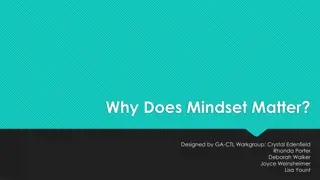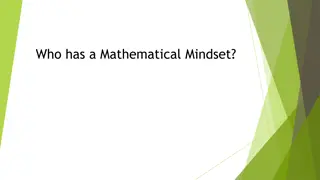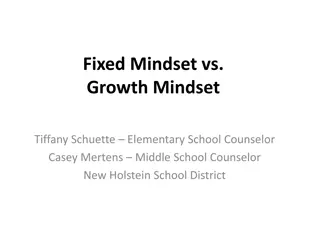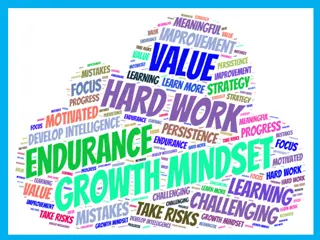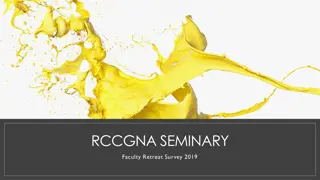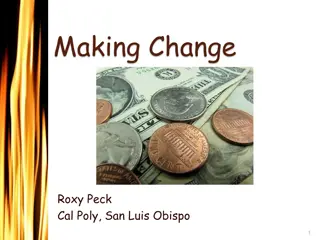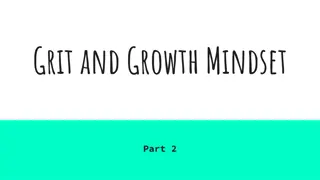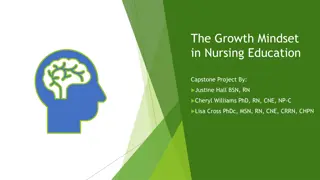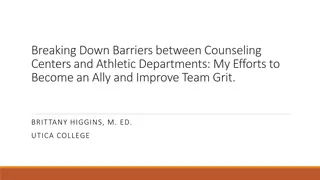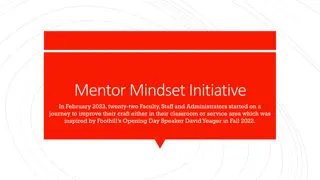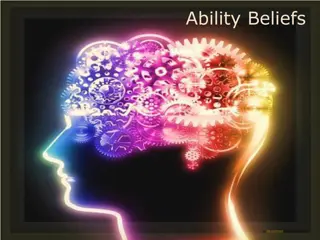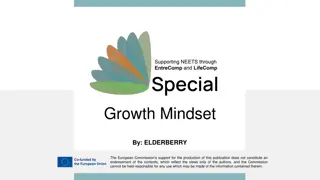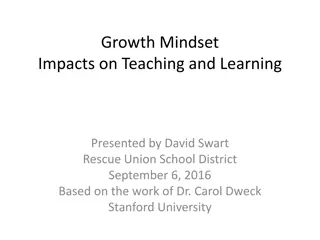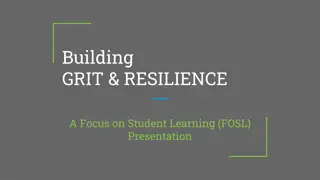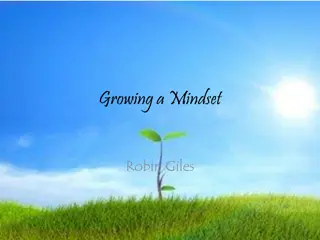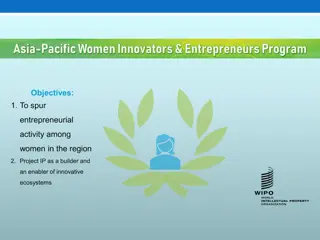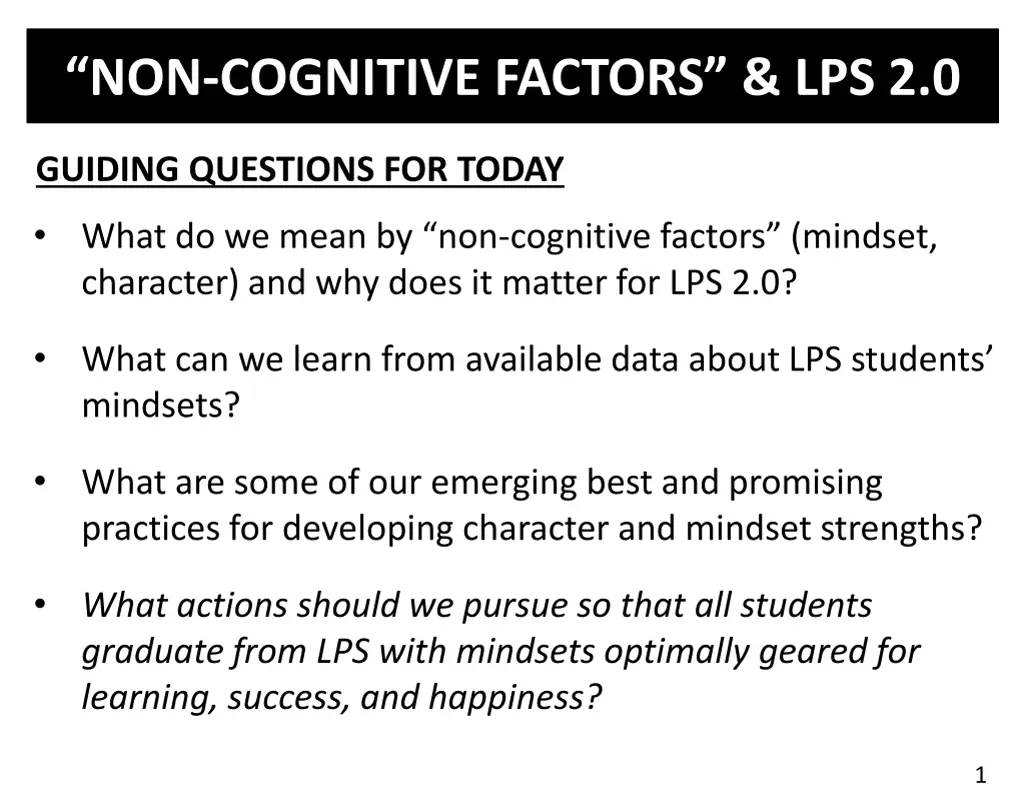
Developing Character and Mindset Strengths for Optimal Learning and Success
Explore the significance of non-cognitive factors like mindset and character in the context of LPS 2.0 education, learn about emerging best practices, and understand the key virtues that contribute to academic achievement.
Download Presentation

Please find below an Image/Link to download the presentation.
The content on the website is provided AS IS for your information and personal use only. It may not be sold, licensed, or shared on other websites without obtaining consent from the author. If you encounter any issues during the download, it is possible that the publisher has removed the file from their server.
You are allowed to download the files provided on this website for personal or commercial use, subject to the condition that they are used lawfully. All files are the property of their respective owners.
The content on the website is provided AS IS for your information and personal use only. It may not be sold, licensed, or shared on other websites without obtaining consent from the author.
E N D
Presentation Transcript
NON-COGNITIVE FACTORS & LPS 2.0 GUIDING QUESTIONS FOR TODAY What do we mean by non-cognitive factors (mindset, character) and why does it matter for LPS 2.0? What can we learn from available data about LPS students mindsets? What are some of our emerging best and promising practices for developing character and mindset strengths? What actions should we pursue so that all students graduate from LPS with mindsets optimally geared for learning, success, and happiness? 1
Role Model Shout-Out Activity Think of a person whose mindset you admire. It may be somebody you know personally or someone you know of because of their work in the world. Reflect on what you admire about this person s mindset. In pairs, share your reflections. Select a word or phrase that describes or represents what you admire about this person s mindset. Please complete the Role Model Form. 3
CCSR Non-Cognitive Factors Model http://ccsr.uchicago.edu/sites/default/files/publications/Noncognitive%20Report.pdf A key task for educators becomes the intentional development of these skills, traits, strategies, and attitudes in conjunction with the development of content knowledge and academic skills. In essence, teachers would play a vital role in helping students move from being passive recipients of academic content to active learners who can manage their workload, assess their progress and status, persist in difficult tasks, and develop a reliable set of strategies to master increasingly complex academic content as they proceed through school. 7
24 Character Virtues Martin Seligman and Christopher Peterson (2004), Positive Psychology WISDOM AND KNOWLEDGE Creativity Curiosity Judgment (critical thinking) Love of Learning Perspective (wisdom) COURAGE Bravery (valor) Perseverance (persistence, industriousness) Honesty (authenticity, integrity) Zest (vitality, enthusiasm, vigor, energy) HUMANITY Love Kindness (generosity, nurturance, care, compassion, altruistic love, niceness ) Social Intelligence (emotional intelligence, personal intelligence) JUSTICE Teamwork (citizenship, social responsibility, loyalty) Fairness Leadership TEMPERANCE Forgiveness Humility Prudence Self-Regulation(self-control) TRANSCENDENCE Appreciation of Beauty and Excellence Gratitude Hope (optimism, future-mindedness) Humor (playfulness) Spirituality (faith, purpose) Bolded bullet points have very strong correlations to academic achievement 4 http://www.viacharacter.org/www/Portals/0/VIA%20Classification.pdf
GRIT & SELF-CONTROL (Perseverance and Self-Regulation) SMASHING THE 3 P s: Personalization Permanence Pervasiveness Angela Duckworth 5
HOPE STEREOTYPE THREAT Hope predicts academic achievement and the predictive power of hope remains significant even when controlling for intelligence (e.g., Snyder, Cheavens, & Sympson, 1997), prior grades (e.g., Gallagher & Lopez, 2008; Snyder et al., 1991; Snyder et al., 2002), self- esteem (Snyder et al., 2002), personality (Day, Hanson, Maltby, Proctor, & Wood, 2010), and college entrance examination scores such as high school GPA and ACT/SAT (Gallagher & Lopez, 2008; Snyder et al., 2002). Performance in academic contexts can be harmed by the awareness that one s behavior might be viewed through the lens of racial, gender, age, and other stereotypes. (Steele & Aronson (1995), Katz, Roberts, and Robinson (1965), Steele (2011). The consequences of stereotype threat extend beyond underachievement on academic tasks and can include self-handicapping strategies, such as reduced practice time for a task (Stone, 2002), and to reduced sense of belonging to a stereotyped domain (Good, Dweck, & Rattan, 2008). Stigmatization can give rise to belonging uncertainty that can undermine the motivation and achievement of people whose group is negatively characterized in academic settings. An intervention that mitigated doubts about social belonging in college raised the academic achievement (e.g., college grades) of Black students but not of White students. The GPA achievement gap between white and black students was halved in 3 years (Walton and Cohen, 2011). 6
MINDSET/CHARACTER STRENGTHS ( a working list) Finishing what one starts; completing something despite obstacles; trying hard even after experiencing failure; a combination of persistence and resilience. GRIT Approaching life with excitement and energy; feeling alive and activated; feeling interested in and engaged with learning and school. ZEST Awareness and active regulation of what one thinks, feels, says and does; being self-disciplined so that behavior matches values and goals. SELF-CONTROL The extent to which individuals believe that they can control events that affect them. LOCUS OF CONTROL Expecting the best in the future and working to achieve it; believing that intelligence is not fixed and success is largely determined by effort (Growth Mindset) OPTIMISM/ HOPE Being aware of and thankful for opportunities that one has and for good things that happen Taking an interest in experience and learning new things for its own sake; finding things fascinating GRATITUDE CURIOSITY Being aware of motives and feelings of other people and oneself, including the ability to dialogue and reason within large and small groups; feeling socially connected. SOCIAL INTELLIGENCE Mitigation of Stereotype Threat, a disruptive concern that one will be evaluated on the basis of a negative stereotype FAIRNESS 9
Mindset Study Session 1. Go to Mindset Artifacts list and review available artifacts. 2. Select 1-3 artifacts to review in 15 minutes and GO FORTH! 3. Review artifact(s) and take notes using this frame: How/why does this artifact matter for LPS students and schools? What are your 1) reactions, 2) ideas, and 3) questions? 4. Share with a partner (5 minutes each person) your key reactions, ideas and questions. 5. Be prepared for a quick whole group shout-out of reactions, ideas and questions. 10
LPS-Stanford Mindset Survey 2013 Survey provided by Stanford research lab PERTS (Project for Education Research that Scales) Survey was tested by LPS Oakland students in February and student input used to guide final revisions and guidelines for administration 330 students from 3 LPS schools took a total of 1047 surveys in Spring 2013 Students reviewed and analyzed their own data in May- June 2013 Survey assessed 5 Mindset Areas Growth Mindset Power in Your Hands (Locus of Control) Fairness (Stereotype Threat) Belonging & Interest Overall Health and Happiness 11
Student Data Analysis Sessions Students conclusions and suggestions and their suggested survey revisions are provided today along with their survey results. 12
Student Survey After Analysis Sessions Is mindset important for students? Should we continue the mindset survey project next year? 46% 41% 12% 2% 48% 38% 13% 1% 0% 20% 40% 60% 80% 100% 0% 20% 40% 60% 80% 100% Definitely Probably Maybe Definitely Not Definitely Probably Maybe Probably Not Should we make changes to the survey? 92% of students surveyed think students should take a mindset survey 1-2 times per month, either as its own activity or worked into daily launches or exit tickets. 17% 23% 33% 22% 4% 0% 20% 40% 60% Probably Not 80% 100% Definitely Probably Maybe Definitely Not 13
Mindset Survey Data Analysis Activity Review and Annotate the Data Wall Highlight to emphasize data you find important Tag key findings or strong reactions with ! Tag questions with ? Tag ideas with IDEA Add a to agree with an already-posted annotation Data provided include: Mindset and/or YouthTruth survey results Student conclusions and suggestions arising from Mindset Survey data analysis and reflection Student recommendations for Mindset Survey revisions 14
Mindset Panel Presentation Michael Fauteux, LPS Hayward Using Exit Ticket and Language to Build Growth Mindsets Olaniyi Solebo, LPS Richmond Teaching Adolescents Mindset: The Role Non- Cognitive Factors Can Play in Shaping School Performance Gautam Thapar, LPS Richmond Integrating Character and Mindset into Instruction 15






